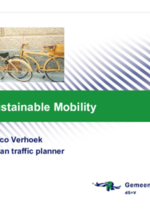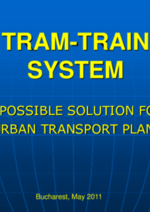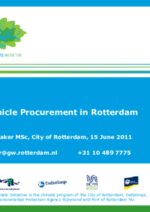TELLUS
The CIVITAS TELLUS project, “Transport and Environment Alliance for Urban Sustainability”, brought together five cities keen to show that integrated urban transport policies can tackle today’s traffic problems: Rotterdam (the Netherlands), Berlin (Germany), Gothenburg (Sweden), Gdynia (Poland) and Bucharest (Romania).

About the project
The key concept behind the TELLUS project was variety. The project comprised a variety of very different cities applying a variety of transport strategies and innovative transport measures in order to make urban transport more sustainable.
A variety of approaches were used to implement those measures and a variety of methods and instruments were applied to conceptualise, monitor, analyse and assess the measures in order to present results and impacts as well as to explain processes, drivers and constraints. The main aims of the project included:
- shifting the modal share in favour of public transport;
- increasing the use of bicycles;
- lowering congestion;
- reducing traffic-related air and noise pollution below national and EC standards;
- decreasing city-centre car usage;
- improving intra-organisational cooperation at city level;
- increasing political and public awareness;
- reducing road casualties; and
- improving public-private cooperation
In general, the focus of the TELLUS project was on translating urban transport policy into the practical implementation of innovative, city-specific measures. However, not all measures were concerned with implementation: some aimed at preparing the ground while others supported strategies and measures by developing a concept to be implemented later. Out of the 48 TELLUS measures, 28 aimed at direct implementation, 17 at concept development and implementation, and three at concept development only.
Implementing sustainable mobility
A total of 48 measures were implemented in CIVITAS TELLUS in the five cooperating cities. Each city implemented a set of measures according to its own needs and priorities. There were no two cities with exactly the same mix of measures. Each one focused on different areas in order to contribute to a cleaner and better transport system:
- Gothenburg prioritised commercial transport – six measures dealt with commercial transport and one with passenger transport.
- Rotterdam selected a combination of strategies and used a balanced mix between commercial and passenger transport – 12 measures dealt with commercial transport addressing technology (clean vehicles), traffic flow, accessibility and planning/organisational aspects; 18 measures were related to passenger transport and addressed mobility management and planning aspects.
- Berlin also opted for a combination of strategies and used a balanced mix between commercial and passenger transport as well as conceptual measures – four measures addressed commercial transport and another four dealt with public transport and private car use; three measures were related to concept development and cross-sectional aspects such as user participation.
- Bucharest focused on public transport – three measures dealt with public transport and one with private car transport.
- Gdynia implemented one measure addressing public and private passenger transport.
Project results
TELLUS provided the opportunity to discuss previously neglected transport topics, especially commercial/goods transportation. Project results and the awareness that TELLUS has raised among all stakeholder groups greatly facilitated the ongoing and future environmental work in the cities.
TELLUS contributed to increase awareness among the business community, especially logistic companies. In some cities these companies participated in more than one measure, increasing the chances of synergy.
There were the first signs of companies looking beyond city boundaries and establishing European-level cooperation. For example, DHL started to cooperate in the field of clean vehicles with TELLUS Gothenburg, which was continued at a later stage with TELLUS Berlin and then finally with Bremen (VIVALDI project).
An important finding in the project was that in future budgets there should be more financial coverage for soft measures such as marketing and awareness raising. Without awareness and satisfaction on the part of the envisaged users, no measure can run successfully. There must be a user-orientated perspective for organizations, but especially for technological applications.
The TELLUS approach resulted in improved cooperation at all levels and strengthened the involvement of stakeholders including residents, politicians, administrations, research and development institutions, the business community and the media. It was also found that backup and support from the city administration were essential, since personal and institutional commitment can be a decisive factor for the success of a measure or a project.
Private demonstrators were also found to be a strong driver in providing innovative transport solutions in many areas such as mobility services, vehicle technology, information technology and new forms of cooperation.
The project also revealed the importance of evaluation – something that received much greater attention in later phases of the CIVITAS Initiative. The collection of data and information for evaluation was often not budgeted for, thus cooperation with evaluators posed an additional workload for some demonstrators. The advantage of evaluation was not always immediately perceived, even though it is as important as the preparation of any new measure or project.
Cities
Fast Facts
December 2002 - January 2006
Project duration
29 partners
Project partners
€32,988,061
Project funding
48 measures
Measures implemented
Knowledge Bank
Mobility solutions
Thematic areas
Collective passenger transport & shared mobility
- Car sharing
Clean & energy-efficient vehicles
Smart, Sustainable, Connected and Shared mobility
- ITS-based enhancement of public transport
Behavioural change & mobility management
Urban logistics
Integrated & inclusive planning
- Spatial planning / land-use planning
- Multimodal hubs
- Cooperation of policy fields and institutional stakeholders
- Sustainable Urban Mobility Plans - SUMP

















